Paolo Martin
Paolo Martin (born 1943) is an Italian car designer widely known for his career with Studio Tecnico Michelotti, Carozzeria Bertone, Pininfarina and De Tomaso/Ghia where he styled the Ferrari Dino Berlinetta Competizione,[1] Ferrari Modulo concept, Fiat 130 Coupé and the Rolls-Royce Camargue.
Paolo Martin | |
|---|---|
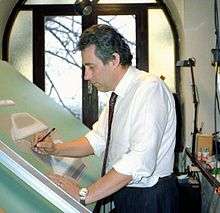 | |
| Born | 7 May 1943 Turin, Italy |
| Nationality | Italian |
| Occupation | Automotive, boat and motorcycle designer |
| Known for | Fiat 130 Coupe, Rolls-Royce Camargue and the Ferrari Modulo |
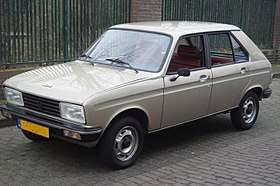
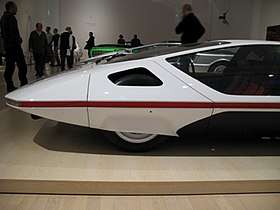
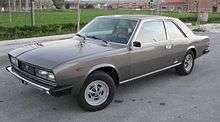
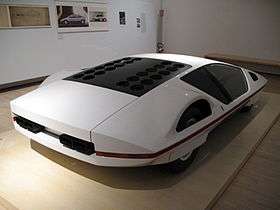
Background and career
Born in Turin, Italy in 1943, Martin began working in 1960 for Giovanni Michelotti's Studio Tecnico Michelotti.[2] In 1967, he started to work for Carozzeria Bertone,[2] and one year later, in 1968 he became Chief of the Styling Department at Carozzeria Pininfarina.[2] He subsequently worked for De Tomaso (1972–76), where he was Style Center Director for Ghia.
Martin's work has included motor cycle and boat design, as well as automotive projects for Stutz, Bugatti, Ferrari, Peugeot, Alfa Romeo as well as Triumph. Since 1976 he has headed a Turin-based independent design consultancy, with clients including Fiat, Nissan, BMW, Subaru, Piaggio, Moto Guzzi, Gilera, Ferretti Kraft, Cigarette, Magum Marine and Dassault Aviation.[2] He participated in the Auto 2011 Design Conference, in Zagreb, Croatia.[3]
Design work
Martin's work has received varied reception. In 2005, the Daily Telegraph called the Fiat 130 Coupé a "majestic blend of severity and grace, boldness and subtlety, sharp angles joined by soft curves, a true catwalk beauty, a masterclass that was widely copied in the Seventies but never equaled."[4]
After its debut at the 1970 Geneva Motor Show, the Ferrari Modulo went on to be shown (repainted white, from its original black) at the 1970 Turin Motor Show and at Osaka's Expo '70, before winning 22 international design awards.[5] A 2007 retrospective said the Modulo was "a milestone in the automobile design history with a deep influence on the 1970′s car styling."[2] In 2008, Car Design News called the Modulo "iconic".[6] The Modulo placed third in Jalopnik's 2008 competition for the top ten best "Wedge Car Designs Of The 60s, 70s and 80s."[5]
By contrast, the Rolls Royce Camargue ranked in 2010 as one of the "10 Worst Cars" as chosen by readers of The Globe and Mail;[7] ranked 38 in the 2005 book Crap Cars by Richard Porter (the author saying the car "looked utterly terrible)"[8] and ranked 92 in a 2008 poll of the 100 ugliest cars of all time by readers of The Daily Telegraph.[9] Autoblog said the Camargue had been ranked "conspicuously low on the list," adding the Camargue "really was horrid, no matter how well it sold."[10] Responding to the Telegraph list, noted automotive journalist James May said the Camargue "is not ugly, either. It has presence, like that pug-faced but well-dressed bloke down the pub."[11]
Series production designs
Martin's design work that has seen series production includes:
- Fiat 130 Coupé[12][13]
- Rolls-Royce Camargue[12][14][15]
- Peugeot 104[16]
- Triumph Spitfire (with Giovanni Michelotti)
- Lancia Beta Montecarlo (Pininfarina)
- Stutz Motor Company IV-Porte and Stutz Royale
Concept designs
His concept design work has included:
- Dino Berlinetta Competizione (1967)[17]
- BMC 1800 (1967)
- Fiat Dino Parigi (1967)
- Alfa Romeo P33 Roadster 1968,[18]
- Fiat Dino Ginevra (1968)
- BLMC 1100 (1968)
- Fiat 128 Teenager (1969)
- Ferrari Sigma (1969)
- Ferrari Modulo[12] (1970)
- Alfa Romeo P33 Cuneo (1971)[19][20]
- NSU Ro80 Pininfarina (1971)
- Ford Fiesta Blue Car (1971, Ghia)
- Fiat Gobi (1984, Maggiora)[21]
- Fiat Halley (1985, Maggiora)[22]
- Nissan Hurricane Li-Ion (1986)[23]
- Fiat Freely Savio (1987, Carrozzeria Savio)[24]
- Fiat Topolino Concept (2008,[25] for Ruoteclassiche Italian magazine)
- Citroen 2CV Concept (2008).[26]
References
- "Dream – 1967 Ferrari Dino 206 Competizione". Conceptcarz.com.
- "Ferrari Modulo story". Car Body Design, 30 October 2007.
- "Report: Auto(r) 2011 Design Conference". Car Body Design, 17 May 2011.
- "Fiat 130 Coupe: Exotic, regal and hedonistic, this coupé represented one of Fiat's finest moments, says Martin Buckley". London: The Daily Telegraph via Telegraph.co.uk, 20 September 2005. Archived from the original on March 26, 2014.
- "Top Ten Best Wedge Car Designs Of The 60s, 70s and 80s". Jalopnik.com, Dec 30 2008.
- "Dream – Cars of the Future Since 1950". Car Design News, Nick Hull, 28 Nov 2008. Archived from the original on 2013-01-18.
- "In Pictures: 10 worst cars chosen by our readers". Toronto: The Globe and Mail, Peter Cheney, Globe and Mail Update, Monday, Feb 22, 2010. 4 January 2013.
- Crap Cars, Richard Porter, p.32. Bloomsbury USA, 2005.
- "The 100 ugliest cars". London: The Daily Telegraph, Telegraph.co.uk, 25 Aug 2008. 10 September 2008.
- "Tie a pork chop around its neck - Telegraph counts down 100 ugliest cars". Autoblog.com, Aug 30, 2008.
- "James May's greatest hits: the ugliest cars of all time". London: The Telegraph.co.uk, James May, 26 May 2011. Archived from the original on February 9, 2012.
- Chapman, Giles (2005-03-15). "Italian style for the many and the few". The Independent. London. Retrieved June 30, 2009.
- Fiat 130 Coupè Archived 2008-05-28 at the Wayback Machine. Paolo Martin Designer, retrieved April 1, 2008
- "Rolls-Royce Camargue 1975". Trauma Auto Archive. Retrieved April 1, 2008.
- "Rolls-Royce Camargue". Paolo Martin Designer. Archived from the original on May 28, 2008. Retrieved April 1, 2008.
- "Peugeot 104". Paolo Martin Designer. Archived from the original on May 28, 2008. Retrieved April 1, 2008.
- "Ferrari Dino Berlinetta Competizione". Car Body Design, 21 September 2007.
- Fusi, Luigi. Alfa Romeo All Cars From 1910. Emmetigrafica, 1978, p. 687.
- "1971 PININFARINA ALFA ROMEO P33 CUNEO". archivioprototipi.it (in Italian). Retrieved 17 December 2019.
- "33 Spider "Cuneo" - 1971". museoalfaromeo.com. Retrieved 17 December 2019.
- "Fiat – Gobi". carrozzieri-italiani.com. Retrieved 1 May 2020.
- "Fiat – Halley". carrozzieri-italiani.com. Retrieved 1 May 2020.
- "Nissan Hurricane Li-ION Concept". Car Body Design, 31 January 2008.
- "1987 SAVIO FIAT FREELY". archivioprototipi.it (in Italian). Retrieved 30 April 2020.
- "Fiat Topolino Concept". Car Body Design, 2 July 2008.
- "Citroen 2CV Concept". Car Body Design, 6 June 2008.
External links
- Paolo Martin's Website
- Video: Paolo Martin, sketches from the 1980s
- Video: Paolo Martin completing a car rendering with Künstler chalks and markers on Canson cardboard
- Design: Sketches by Paul Martin for Giovanni Michelotti (1961-1966) (translated from Italian)
- Pininfarina's Paolo Martin revisits the Ferrari Modulo with Enzo-based design study
- Pininfarina Ferrari Dino 206C Competizione, Paolo Martin, 1967
- 1970 Ferrari Modulo